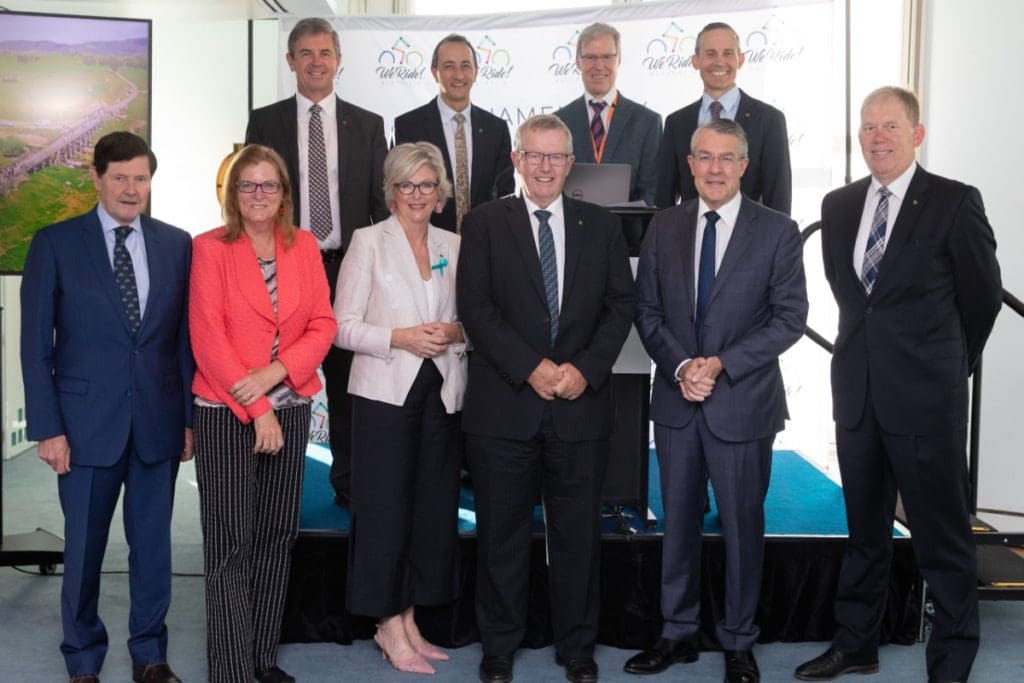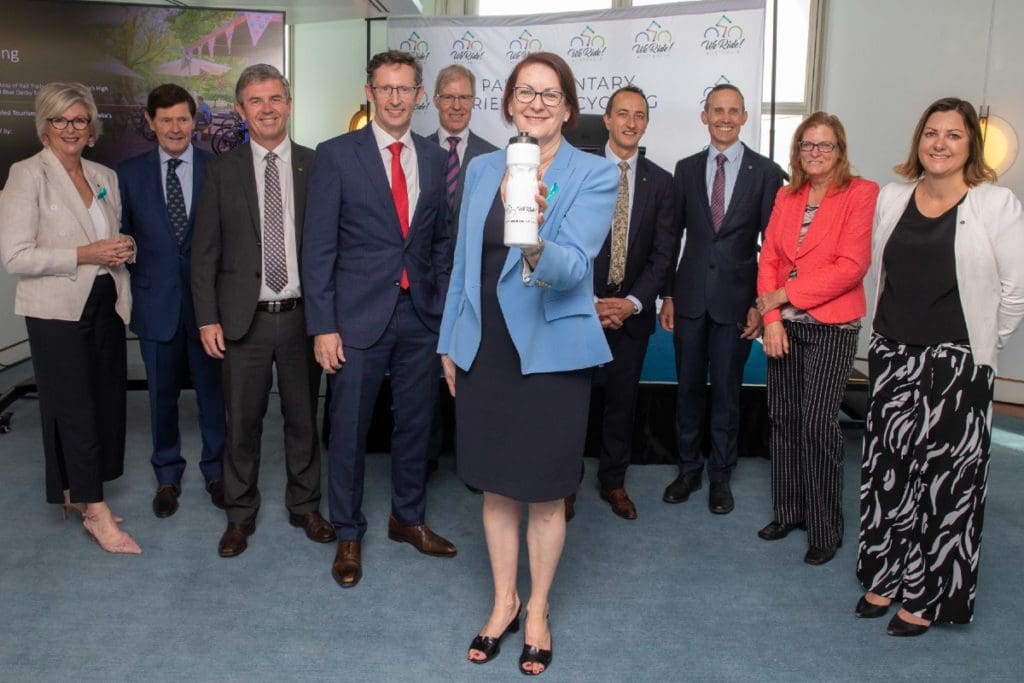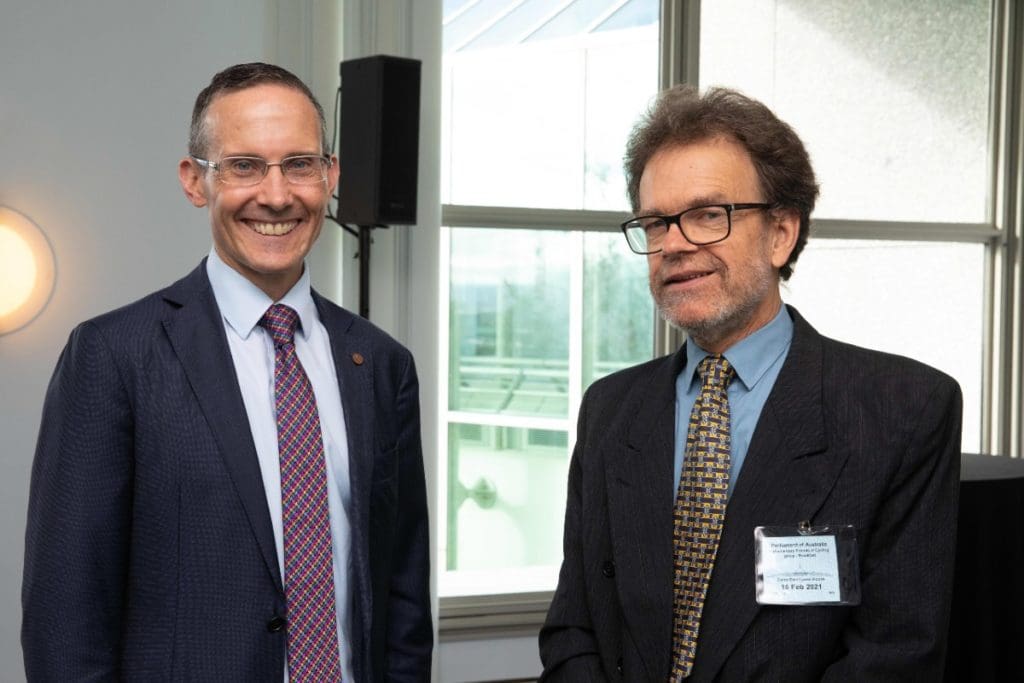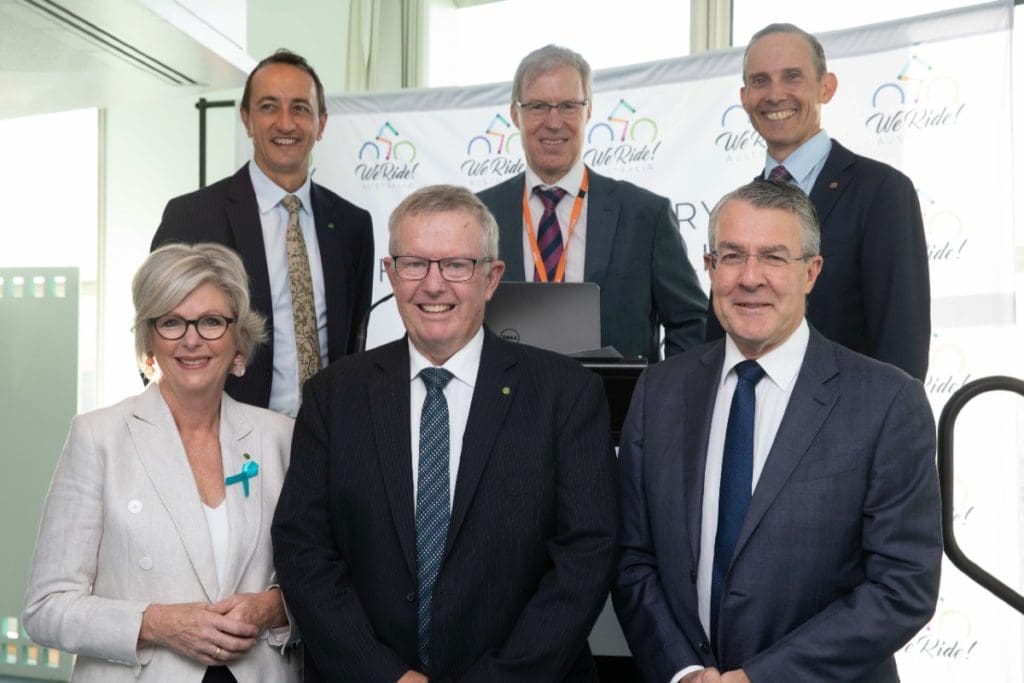Cycling’s Friends Speak Up in Federal Parliament

Canberra / ACT
On Tuesday 16th February the second ever Parliamentary Friends of Cycling event was held within Australia’s parliament house in Canberra.
There are over 100 Parliamentary Friendship Groups (PFG’s) covering a huge range of interests mainly across environmental, health and social issues. Although these groups do not hold any formal legislative power, they provide an important opportunity for each represented cause to gain access to parliamentarians and for those parliamentarians to go on the public record with supportive comments.
Despite recent bending and battering both here and overseas, the words of politicians are still important. In fact, they remain their main tool in shaping policy and drafting legislation.
When you visit Australia’s parliament house, every sense reminds you that you’re inside the centre of power in this nation. From the moment you enter via high levels of security and are escorted down craftsman built halls lined with famous original works of art, the building itself conveys this message.
It’s also the last bastion of formal dress code, where a suit and tie for men and ‘full power dressing’ for women is expected, even if not officially required.
This sense of power is not misplaced. The politicians elected to represent us who meet in this place are the decision makers over an annual budget of well over half a trillion dollars per year. For example in the current 2020/21 financial year, including a Covid boost of about $100 billion, total expenditures will be about $670 billion. That’s over 1.8 billion dollars every day of the year and a staggering 34.4% of our gross domestic product (GDP).
I think the potential for cycling is enormous.
Hon Mark Coulton, Minister for Regional Health, Regional Communities and Local Government
Canberra’s power extends beyond just money, to legislating about cultural and social issues including the rights of minority groups which can have major impacts upon the lives of people within these groups.
Currently this power is vested in 76 Senators (12 per state and two per territory) and 151 Members, each representing a single electorate which on average contains approximately 165,000 residents.
If the cycling community wants to gain influence and favourable outcomes from our most powerful politicians, we first need to build constructive relationships. Cycling is far better placed than many other groups in this regards, thanks to the tireless work of the bike industry funded We Ride Australia’s Canberra based Director – National Relationships, Stephen Hodge.
Cycling has a secret weapon that other most other lobby groups can only envy. For many years Stephen has been hosting a regular weekly social group ride whenever parliament is sitting called Riders on the Hill.

As anyone who has ridden much will know, going for a ride together is a great way to build friendships and break down barriers. The evidence of this was plain to see at this most recent Cycling PFG breakfast, where there was a palpable atmosphere of goodwill and bi-partisanship despite there being attendees from across the political spectrum: Greens, Independents, Labour, Liberal and National.
Just getting Senators and MP’s to attend is an important first step and sign of potential influence. There was stiff competition on the morning of the breakfast, with a larger event being hosted just down the hallway at which both the Prime Minister and Leader of the Opposition were speaking. But the cycling breakfast still attracted about a dozen politicians, plus some of their ‘staffers’ who are also important gatekeepers. Attendance would have been even higher, but many were stuck in Victoria due to the sudden five day lockdown.
Each Cycling PFG event will have theme and today’s was the benefits of cycle tourism, particularly funding for construction of rail trails, for local and regional communities.
Stephen Hodge hosted the morning’s formalities. What follows below are edited comments from over half an hour of speeches in total.
Stephen began by saying, “I hope that this Friends of Cycling event will be a concise overview for some of you about key facts and case studies on cycle tourism and the health and transport benefits that accrue from investment in cycle tourism.
“There has been a massive growth in cycling through Covid. That is an enormous opportunity for us to shift behaviour for all Australians.”
I think both sides of politics can directly and truthfully say that we are committed to promoting cycling in Australia.
Hon Mark Dreyfus, former Attorney General.
Stephen then introduced Dave Sharma MP, (Liberal) who is one of the co-convenors of the Cycling PFG.
“Today is about understanding how two wheeled tourism can benefit not just in urban areas but also regional areas, and how a small amount of investment can actually have quite an outsized impact in attracting people to an area,” he said.
“I think all of us know this from our own electorates. Even in mine (Wentworth) which is an inner city electorate we’ve got Centennial Park, which is a Mecca for cyclists, not just MAMILS (middle aged men in lycra) like me on the weekends, but recreational cyclists and kids learning to ride a bike.”
Dave then introduced Mark Coulton (National) who is Minister for Regional Health, Regional Communities and Local Government. In terms of land mass, his electorate of Parkes is by far the largest in New South Wales stretching across to the South Australian and Queensland borders.
“I came to cycling at quite a late age really and did it for health purposes,” he recalled. “There’s a bike that lives in the back of my car and wherever I am in my electorate I can get up in the morning and go for a ride.
“I think the potential for cycling is enormous. There are some challenges with rail trails because no state transport minister wants their name on a document that officially closes a railway line and quite often the community support isn’t as it should be. But they’re worth fighting for. They’re a wonderful use of a community asset and I think we are on the verge of seeing that revolution. People are discovering Australia. It’s great.”

The next speaker was Dr Andrew Leigh (Labour) who represents the Canberra based seat of Fenner. He is also a co-convenor of the Cycling PFG.
He spoke only briefly before introducing the next speaker. “I’ve been a keen cyclist since my youth,” he said. “What you see on two wheels is just so different to what you see out of car windows.”
Mark Dreyfus QC (Labor) is the former Attorney General of Australia and represents the Melbourne suburban electorate of Isaacs.
“It’s good to see people from across the political spectrum here,” he began. “It’s a really good time to be talking about cycling tourism in Australia. I hope all of you will go back to your electorates, go back and talk to state governments, talk to whoever is responsible in the federal government for encouraging cycling tourism.
“I can speak from personal experience, cycle tourism is excellent for regions.
“There’s a wonderful example of New Zealand’s Otago Rail Trail. It has brought incredible benefits to local communities along its 152 kilometre length. I’m hoping to see that kind of activity in Australia.
That’s another thing about cycling. It is for everybody. It does have a massive economic impact. It’s great for your friendships and it’s great seeing the country. I’m super proud to be representing an electorate that’s so rich in cycle tourism.
Dr Helen Haines, Independent Member for Indi
“The Victorian High Country attracts 3.8 million visitors, spending 1.1 billion dollars annually. Cycle tourism is one of the pillars of that tourist activity. There are 103,000 cycle tourists already visiting Victoria’s High Country each year, spending 50 million dollars in the region, with projections of it going to 250,000 cycle visitors by 2025, so there’s tremendous expansion there.
“I’ve had the privilege of riding the Beechworth rail trail. Rail trails, despite the difficulty of setting them up, once they are set up are a marvellous attraction for tourism of all kinds.
No steep hills on a rail trail… it makes them accessible for all kinds of riders.
“In 2003 the town of Forest in the Otway’s saw the last of its wood mills close. It left the town with not much future. Rather than letting the town literally decay, the state government commissioned a study into the town which made a suggestion that it become a home for mountain biking. And that has happened. Forest, two decades later is a world class biking destination and cycling is actually the backbone of Forest’s modern economy.
“The little town of Derby in north west Tasmania is also recognised across the world as a great cycling destination. It’s because of deliberate decisions that councils, regional tourism bodies, state governments and the federal government have made over the last several years.
“I think both sides of politics can directly and truthfully say that we are committed to promoting cycling in Australia. I hope that bipartisanship on cycling long continues. But it does require effort and I’m hoping to see more of that effort from all three spheres of government.”

Next, the third convenor of the Cycling PFG, Dr Helen Haines spoke. Helen is the independent member of Indi, which covers the north east ‘high country’ region of Victoria plus regional cities along the Hume Highway including Wangaratta and Woodonga.
She said, “Cycling really is so much about getting out with your friends. Getting out with like-minded people and seeing new places through the eyes of them on your bicycle, and I’ve seen some beautiful parts of our nation.
“In Indi We have three rail trails and more to come, I hope. Indi has nine shires and four alpine resorts and right across those shires tourism through cycling is super important.
“We also know that if we increased our recreational cycling (in Victoria’s North East) by just 10% we’d generate another 28.9 million dollars in revenue into our region alone. That’s big dollars. Big impact, fantastic for regional development.
“Cycle tourism now is appealing to all abilities. I had the great pleasure of being in Marysville and visiting Lake Mountain just last Thursday. The Breaking the Boundaries group have just opened a fantastic new all abilities mountain bike trail.
“That’s another thing about cycling It is for everybody. It does have a massive economic impact. It’s great for your friendships and it’s great seeing the country. I’m super proud to be representing an electorate that’s so rich in cycle tourism.”
Stephen Hodge then introduced the guest speaker Dr Stephen Kaye, Vice President of Rial Trails Australia, by saying, “There are very few places where you can go out with young children in an active way, that involves a vehicle, on two wheels and be totally safe and only concerned about having fun as a family. Rail trails and other trails are such a thing.”
Unfortunately, due to the Victorian lockdown Stephen Kaye was unable to attend in person, and gave his presentation via a pre-recorded video.
“In Australia there are about 100 rail trails,” he reported.
“Doing physical activity is fantastic for people’s mental and physical health. As a GP I know that all chronic disease is treated much better when people are more physically active and enjoying the great outdoors.
“There are still many rail trails to be built in Australia. There are many to be improved and many that are in the development stage.
“By far the most exciting one that’s coming at the moment is in the Northern Rivers of NSW through the Murwillumbah, Byron Bay, Casino and Lismore area. There are airports and railway stations at both ends of the trail. It goes through beautiful towns, seaside beaches, already established tourism facilities as well as heritage national park.”
With a federal election tipped to be called in the second half of this year, Stephen Hodge is hoping to hold at least one more Cycling PFG event prior to that date, probably focusing upon the economic benefits of federal government investment in cycling infrastructure, such as protected paths in our cities.
This article was previously published in The Latz Report.
